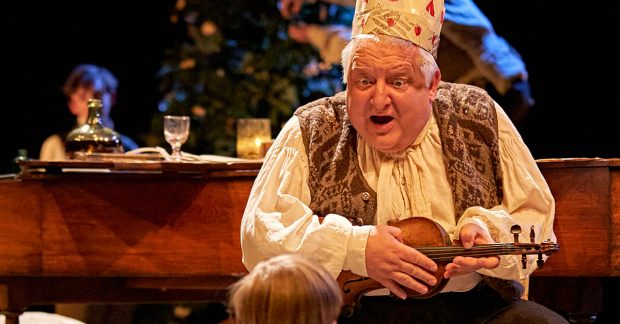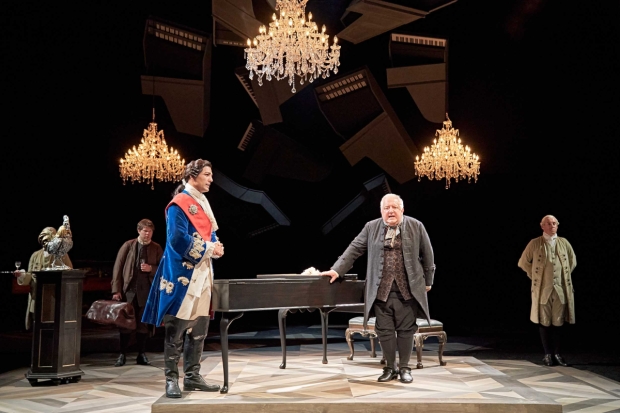
© Manuel Harlan
In the usually breezy leafy square outside London Bridge, a massive turquoise enclosure has been erected with the words UEFA plastered all over it. Tucked in a far corner, near-invisible thanks to the tall partitions erected for the Euros, the Bridge Theatre sits patiently, welcoming socially distanced audiences back. I'm not one for metaphor but sometimes these things write themselves.
Inside the wonderfully ventilated auditorium, away from the (justifiably) excited Spanish fans on Monday night, Vicki Mortimer's set greets theatregoers like some glamorous art installation: pianos, unencumbered by gravity, hover over the stage with ghoulish magic.
That's the canvas for Nina Raine's new historical drama Bach and Sons, which follows the life of the rather legendary late-Baroque composer Johann Sebastian Bach, as well as that of his various sons: notably Wilhelm and Carl, who both went on to forge musical careers of their own (though constantly under the shadow of their father)
For those who have thrown their GCSE music textbooks into the dustbin of history, one of J S Bach's key musical concepts is that of counterpoint – the layering of multiple melodies on top of one another, sometimes acting in harmony, other times reaching unnerving discord. Again, not one for metaphor, but that's basically how plays work: multiple characters layered on top of one another in scenes, clashing or chiming with one another. Here, the Bachs cast themselves across Europe during the early stages of the 18th centuries, spurning and thriving under differing patronages.
As an everyday theatregoer (and indeed many punters during the interval) may remark – it's a similar trick to that pulled off with Shaffer's Amadeus – though the tone and setting is of a very different shape here. Rather than aggressive and frantic, Raine's text is pensive, inquisitive at times: similar to John Logan's Red, it places Bach in the middle of a major musical upheaval – Europe is done with his beloved harpsichord, and enchanted with the more sensual fortepiano. In one neat swipe, Bach, bewildered, comes to realise that his music actually works better on an instrument he had long rejected.

© Manuel Harlan
Raine makes a successful push to pitch Bach's life against a backdrop of massive infant mortality – swaddling some scenes in outright despair: it's hard not to be moved by Bach's second wife Anna's wail as she exclaims: "I can't remember not being pregnant, and having to bury a child." But for the most part the piece feels encumbered by historical exposition when director Nick Hytner could make it lithe and punchy – something that was made all the easier by Raine's smart decision to make the dialogue anachronistically modern – a whole wad of F-bombs giving the foul-mouthed elder Bach a fun novelty.
Performances wise, Russell Beale injects a healthy dose of charisma into proceedings, constantly affecting the stoop of a man hunched over sheet music while semi-squatting at a harpsichord stool. There's some very solid work from Samuel Blenkin as Bach's second son, Carl (also fantastic in The Ocean at the End of the Lane), pining for his father's affection while embracing the modern developments in music tempting him onwards.
Thrilling trills of ideas are peppered throughout and there's a lot to strike a chord with music aficionados – Russell Beale has a whale of a time conducting us, the audience, as if we were the orchestra, revelling in smarmy put-downs at tenors before taking the wind out of the brass sections' sails. One moment, where the elder Bach visits the court of Frederick the Great, also endures: Pravessh Rana plasters a devilish smile over the jaded, nihilistic monarch's face – conjuring up a man forever smarting from his own father's abuses. For a healthy ten minutes or so, the pious composer and the irreligious King battle through words and melodies with gripping vividity – before the show slides back into a more one-note familial setting.













